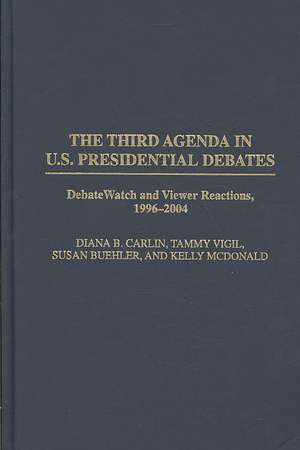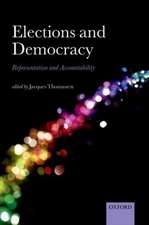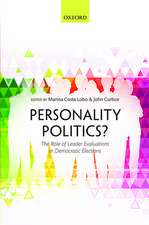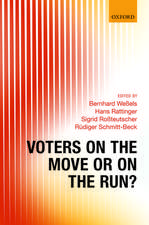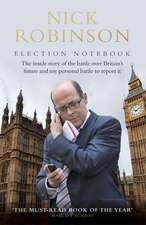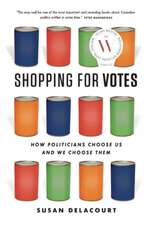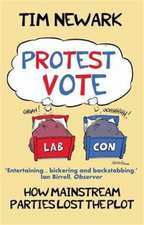The Third Agenda in U.S. Presidential Debates: DebateWatch and Viewer Reactions, 1996-2004: Praeger Series in Political Communication
Autor Susan Buehler, Diana B. Carlin, Kelly McDonald, Tammy Vigilen Limba Engleză Hardback – 29 noi 2008 – vârsta până la 17 ani
Din seria Praeger Series in Political Communication
- 12%
 Preț: 241.48 lei
Preț: 241.48 lei - 19%
 Preț: 363.89 lei
Preț: 363.89 lei - 27%
 Preț: 439.44 lei
Preț: 439.44 lei - 28%
 Preț: 437.15 lei
Preț: 437.15 lei - 23%
 Preț: 178.29 lei
Preț: 178.29 lei - 27%
 Preț: 438.76 lei
Preț: 438.76 lei - 22%
 Preț: 230.98 lei
Preț: 230.98 lei - 28%
 Preț: 437.40 lei
Preț: 437.40 lei - 28%
 Preț: 436.80 lei
Preț: 436.80 lei - 38%
 Preț: 438.33 lei
Preț: 438.33 lei - 23%
 Preț: 228.85 lei
Preț: 228.85 lei - 22%
 Preț: 234.20 lei
Preț: 234.20 lei - 22%
 Preț: 231.16 lei
Preț: 231.16 lei - 18%
 Preț: 240.03 lei
Preț: 240.03 lei - 22%
 Preț: 230.43 lei
Preț: 230.43 lei - 22%
 Preț: 237.90 lei
Preț: 237.90 lei - 22%
 Preț: 233.55 lei
Preț: 233.55 lei - 19%
 Preț: 237.16 lei
Preț: 237.16 lei - 27%
 Preț: 439.60 lei
Preț: 439.60 lei - 11%
 Preț: 438.67 lei
Preț: 438.67 lei - 27%
 Preț: 346.00 lei
Preț: 346.00 lei - 27%
 Preț: 438.76 lei
Preț: 438.76 lei - 27%
 Preț: 439.51 lei
Preț: 439.51 lei - 37%
 Preț: 511.97 lei
Preț: 511.97 lei - 20%
 Preț: 178.01 lei
Preț: 178.01 lei - 22%
 Preț: 238.73 lei
Preț: 238.73 lei - 27%
 Preț: 345.90 lei
Preț: 345.90 lei - 22%
 Preț: 231.16 lei
Preț: 231.16 lei - 23%
 Preț: 173.53 lei
Preț: 173.53 lei - 27%
 Preț: 347.01 lei
Preț: 347.01 lei - 24%
 Preț: 463.13 lei
Preț: 463.13 lei - 27%
 Preț: 438.76 lei
Preț: 438.76 lei - 27%
 Preț: 346.00 lei
Preț: 346.00 lei - 27%
 Preț: 438.67 lei
Preț: 438.67 lei - 28%
 Preț: 343.98 lei
Preț: 343.98 lei - 28%
 Preț: 435.97 lei
Preț: 435.97 lei - 28%
 Preț: 438.07 lei
Preț: 438.07 lei - 38%
 Preț: 343.63 lei
Preț: 343.63 lei - 24%
 Preț: 466.84 lei
Preț: 466.84 lei - 27%
 Preț: 463.55 lei
Preț: 463.55 lei - 27%
 Preț: 439.01 lei
Preț: 439.01 lei - 22%
 Preț: 234.20 lei
Preț: 234.20 lei - 28%
 Preț: 437.75 lei
Preț: 437.75 lei - 18%
 Preț: 302.13 lei
Preț: 302.13 lei
Preț: 439.09 lei
Preț vechi: 604.94 lei
-27% Nou
Puncte Express: 659
Preț estimativ în valută:
84.03€ • 87.20$ • 70.23£
84.03€ • 87.20$ • 70.23£
Carte tipărită la comandă
Livrare economică 17-31 martie
Preluare comenzi: 021 569.72.76
Specificații
ISBN-13: 9780275967734
ISBN-10: 0275967735
Pagini: 296
Dimensiuni: 156 x 235 x 28 mm
Greutate: 0.59 kg
Editura: Bloomsbury Publishing
Colecția Praeger
Seria Praeger Series in Political Communication
Locul publicării:New York, United States
ISBN-10: 0275967735
Pagini: 296
Dimensiuni: 156 x 235 x 28 mm
Greutate: 0.59 kg
Editura: Bloomsbury Publishing
Colecția Praeger
Seria Praeger Series in Political Communication
Locul publicării:New York, United States
Notă biografică
Diana B. Carlin is a professor of Communication Studies at the University of Kansas. She has conducted research on presidential debates since 1980 and created the DebateWatch project. She served on the advisory board for the Commission on Presidential Debates from 1987 until 2000. She is also the co-editor of and contributor to The 1992 Presidential Debates in Focus.Kelly M. McDonald is an assistant professor at The Hugh Downs School of Human Communication where he served as Director of Forensics for five years. He is active in the Consortium for Strategic Communication, an initiative focused on national security and terrorism related questions from a message based perspective. He has published articles in Argumentation & Advocacy and in proceedings from the Conference on Argumentation.Tammy Vigil is an Assistant Professor at Boston University's College of Communication. Her research interests include political communication, rhetoric, and popular culture.Susan Buehler served as a graduate research assistant on the 1996 Ford Foundation grant project that started DebateWatch. She currently works as a part-time administrator for the University of Kansas.
Cuprins
Series ForewordPrefaceAcknowledgmentsChapter 1 Revealing the Third AgendaChapter 2 Why Study, Watch, and Talk about Debates?Chapter 3 DebateWatch: Developing the StudyChapter 4 Why Format MattersChapter 5 Searching for a President: What Matters to Voters?Chapter 6 Citizen Talk Beyond the Candidates and IssuesChapter 7 Whos on Deck? Talk about Vice Presidents and Future PresidentsChapter 8 Generation Next: Youth as Political ActorsChapter 9 Nonvoters Speak OutChapter 10 The Majors and the Minors: Who Should Participate in Debates?Chapter 11 Presidential Debates and Public Talk: The Next ChapterAppendixesA. DebateWatch 96 MaterialsB. 1997 Post-Election Study Surveys and TablesC. DebateWatch 2000 MaterialsD. DebateWatch 2004 MaterialsNotesSelected Bibliography
Recenzii
It offers new data and a perspective (qualitative) on presidential debates that differs from most work in this area. . . . There is no question that this book offers a unique and important contribution to the literature. It merits a place in libraries and on scholars' bookshelves.
